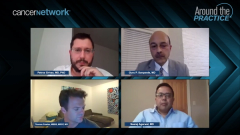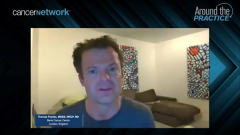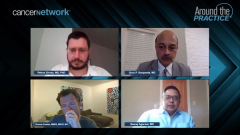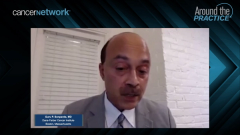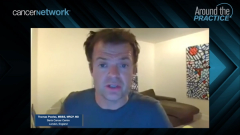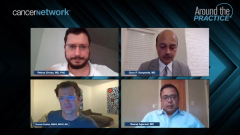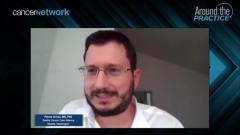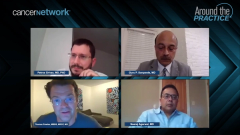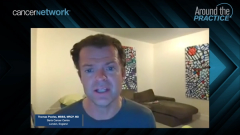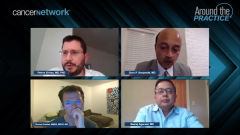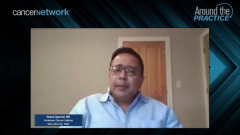
Adjuvant ICI Therapy in Advanced Urothelial Cancer
Guru P. Sonpavde, MD, leads the discussion on the use of adjuvant nivolumab in metastatic urothelial carcinoma and the impact on the subsequent use of immune checkpoint inhibitors in recurrent disease.
Episodes in this series

Petros Grivas, MD, PhD:Guru, let me ask something different. A colleague in the audience asked about the adjuvant setting. We’ve seen the data with adjuvant atezolizumab. I want to draw attention to the great work by Tom looking at circulating tumor DNA [ctDNA] that was published in Nature [in June]. Also, the adjuvant placebo data from CheckMate 274. The question is, do you think nivolumab will be approved for the adjuvant setting? If so, all comers who are PD-L1 high? Also, how do you think this will impact subsequent use of checkpoint inhibitor metastatic disease if the patient has recurrence later?
Guru P. Sonpavde, MD:First, the CheckMate 274 data are basically positive. The trial met its coprimary end points in terms of DFS [disease-free survival] in all comers and PD-L1–high patients. I expect it to be approved. I wish I’d seen some of the survival curves. I guess we’ll see that at some point. I know the atezolizumab data were disappointing. I’ve seen the ctDNA data, which are interesting. I wonder how the ctDNA would perform for the minimal residual disease post-op as determined in the CheckMate 274 nivolumab data set. I’m skeptical it will perform as good because the DFS improvement was medially immediate of 1 year. It’s going to be hard to identify a patient population that didn’t benefit with avelumab.
It would be nice to apply the ctDNA data to the CheckMate 274 trial. I’m optimistic that the CheckMate 274 would change practice. It still needs a lot of work, of course. The median DFS in the experimental arm was beyond 1 year, so it seemed as if most patients were maybe recurring after the nivolumab had stopped. I don’t think we know what happens if you repeat avelumab or another checkpoint inhibitor in this patient. This too needs more work concerning the appropriate disease-free interval or treatment-free interval with a repeated checkpoint inhibitor in that setting.
Petros Grivas, MD, PhD:Thank you, Guru. Great point. Tom, let me ask you a practical question. Let’s say, in the future avelumab gets approved in the United States. A patient gets…nivolumab for a year and has a progression, let’s say 1 year after stopping nivolumab. The patient isn’t fit for cisplatin. They get carbogen metastatic disease. They’ve never received chemotherapy before. Would you give avelumab to that patient? After stabilization or response to carbogen with a prior adjuvant therapy.
Thomas Powles, MBBS, MRCP, MD: It’s a complicated issue. You could say, “It’s been a year. They haven’t had immunotherapy for a while. They haven’t had immunotherapy in the metastatic setting.” Under those circumstances, it’s a very reasonable approach. Is it likely to be as active having as the immunotherapy-naïve population? We don’t know the answer. Under those circumstances, you wouldn’t want to sequence enfortumab vedotin or the other drugs at that point. That’s more toxic, and that’s not licensed in individuals whose cancer isn’t progressing. It’s a reasonable approach. We probably need to do some work on these trials or in the trials in this area for patients whose cancers progress after adjuvant therapy if adjuvant therapy becomes a global standard of care.
There’s a need to see some form of survival signal even if it’s trending in the right direction. But without survival, it’s very hard to be very supportive of an adjuvant approach. Remember, at least half the patients will be overtreated by definition and clearly will be in harm’s way based on that. Because we know immune checkpoint inhibitors are associated with long-term, irreversible toxicity, we know that we’re doing harm. Do we know they’re living longer? No. There’s a grayness around that issue, and I suspect that without any survival signal, even if it’s an early trend toward it, it’s much harder for us to persuade patients that this is the right approach. Is maintenance avelumab reasonable in that setting? It’s reasonable. It hasn’t been proven. It may or may not be as active. I’d scan regularly.
Neeraj Agarwal, MD: Petros, if I may share my opinion. I doubt you’ll be able to do JAVELIN Bladder 100 trial again in this setting, right? I have to come up with my own perspective. If I looked at someone who got neoadjuvant cisplatin chemotherapy and had disease recurrence 4 months or after, then we give cisplatin again. If immunotherapy with nivolumab was given in the adjuvant setting, and the patient didn’t have progression during nivolumab, had nivolumab therapy, and had progression after, I’d definitely give the benefit of doubt, and I’d love to use the checkpoint inhibitor again in maintenance therapy. But if the patient had progression during nivolumab therapy, I’d go on to second-line therapy in this case and probably use enfortumab vedotin, which is approved for patients who have metastatic disease and have progressed on monotherapy with the PD-1 inhibitor. That would be my thought process.
Thomas Powles, MBBS, MRCP, MD: That’s a reasonable approach.
Petros Grivas, MD, PhD:That’s a great discussion, guys.
Transcript edited for clarity.
Newsletter
Stay up to date on recent advances in the multidisciplinary approach to cancer.


